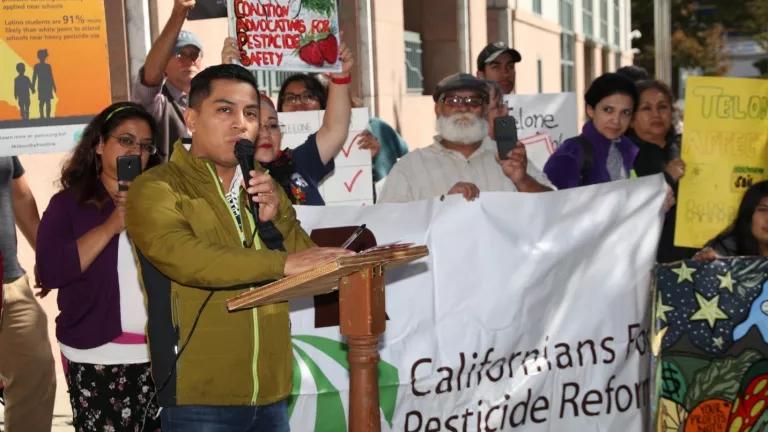
The California State Capitol building
Update: Of the eight priority bills listed below, five were signed into law and three were vetoed. Those signed include: AB 1817 (Ting), AB 2316 (Ward), AB 2700 (McCarty), SB 502 (Allen), and SB 1157 (Hertzberg). The bill to establish setbacks from oil drilling (SB 1137 by Gonzalez and Limon) was also signed along with the others in the climate package. NRDC and our partners are disappointed with the vetoes of AB 2146 (Bauer-Kahan) which would have limited uses of toxic neonic pesticides, SB 222 (Dodd) which would have established a low-income water rate assistance program, and AB 2438 (Friedman) which would have linked the state's transportation spending to our climate goals.
The California legislature finished its work and adjourned in the early morning hours of September 1st sending hundreds of bills to Governor Newsom’s desk. The Governor now has until September 30 to sign or veto these bills. Environmental and health champions in the legislature authored and supported key bills to tackle issues ranging from toxic chemicals and pesticides to community solar, water affordability and electric vehicles. NRDC and our coalition partners advocated bold environmental, climate and public health protection bills.
Below are summaries of our top bills on Governor Newsom’s desk.
- AB 1817 (Ting) phases out PFAS chemicals from textiles and clothing. Recent polling shows that 78 percent of Californians support this policy.
- AB 2146 (Bauer-Kahan) phases out non-agricultural uses of neonic pesticides that are harming children’s health and endangering bees and butterflies.
- AB 2316 (Ward) Establishes a community solar program to bring the benefits of clean energy and energy storage to more communities, especially those in low-income areas and people in multi-family homes.
- AB 2438 (Friedman) Aligns state transportation investments with California’s climate goals.
- AB 2700 (McCarty) Requires better grid planning, investment and upgrades to accommodate widespread transportation electrification.
- SB 222 (Dodd) Establishes a first in the nation Low-Income Water Rate Assistance Program to ensure that all Californians can access drinking water and wastewater services regardless of income.
- SB 502 (Allen) Updates the state’s Safer Consumer Products Program (Green Chemistry) to make it more effective at reducing the hazards of toxic chemicals in consumer products.
- SB 1157 (Hertzberg) Establishes indoor water use standards as the final legislative step to full implementation of 2018’s “Making Conservation a California Way of Life” legislative package.
We worked with coalition partners and allies to support numerous other bills on a range of environmental and social justice issues. One bill that NRDC supported and Newsom signed on Labor Day was AB 257 by Assembly Member Holden to establish a statewide council to advance minimum standards on working conditions and wages for fast food workers. Additionally, we worked with environmental justice groups and other allies to win significant improvements to SB 54, the state’s new law to address the proliferation of plastic and the resulting impacts. The final bill allows for greater oversight of the industry groups tasked with meeting the state’s ambitious reduction and recycling goals for plastic. It also helps ensure that problematic and polluting technologies that have been greenwashed by the plastics industry as “advanced recycling” or “chemical recycling” do not count towards recycling targets.
California’s Climate Leadership
The legislature heeded the Governor’s call for bold climate action this session. In August, the Governor announced his climate priorities and urged the legislature to pass five climate proposals or “pillars.” NRDC and several partners opposed what became a sixth pillar, the push to extend the life of the Diablo Canyon nuclear power plant (DCPP) since we were parties to the 2016 agreement that required orderly closure of DCPP by 2025. However, we are excited that once signed, California will have new climate laws and community protections on the books.
Newsom’s climate package includes the following measures:
- SB 1137 (Gonzalez) Setbacks – establishes health and safety buffer zones or “setbacks” for new and reworked oil wells. This has been a longstanding priority for NRDC and community partners led by the Visión coalition and Center on Race Poverty and the Environment (CRPE).
- AB 1279 (Muratsuchi) Carbon neutrality goal - Codifies California’s 2045 carbon neutrality goal and requires statewide anthropogenic emissions to be reduced by at least 85% below the state’s GHG limit. This is an updated version of legislation that stalled in the final days of session last year.
- AB 1757 (C. Garcia) Nature-based climate solutions – Requires the state to establish targets for carbon reduction and sequestration from natural and working lands
- SB 905 (Caballero and Skinner) Carbon capture and storage (CCS) – Establishes a framework for capture, utilization, and storage of compressed carbon dioxide. Its scope covers CCS, and carbon dioxide removal (CDR) and it requires CARB to set up a program to regulate CCS, CDR, CO2 transportation and permanent geologic storage in California with community and environmental protections. Together with SB 1314 (Limón), SB 905 also bans the use of captured and recovered carbon in enhanced oil recovery.
- SB 1020 (Laird) Pathway to CA’s clean energy future – Establishes interim targets to the statewide 100% clean energy policy.
- SB 846 (Dodd and Cunningham) Diablo Canyon – Establishes a process that could result in an extension of the operating life of Diablo Canyon nuclear power plant (DCPP) for five years from its current retirement date of 2025. Signed by Newsom on September 2nd.
One additional bill failed in the legislature: AB 2133 (Quirk) which would have increased the state’s GHG reduction goal to 55% below 1990 levels by 2030.
State Budget
NRDC advocated in the state budget process for investments to reduce greenhouse gas emissions and air pollution, protect natural resources, and build community resilience. The governor and legislature committed to historic climate and clean energy investments. In particular, Californians can celebrate significant gains in the energy trailer bill, AB 209 (including fixes to harmful provisions in the June energy bill), and the state’s plans to invest $1.4 billion in climate-resilient homes, schools and communities. We will diligently monitor the state budget process over the next few years to ensure these commitments are met.
On water and natural resources, NRDC and our partners supported significant state funding for safe and affordable drinking water, for large-scale water recycling, and improving water use efficiency in disadvantaged households, as well as opposing the administration’s proposals for hundreds of millions of dollars for so-called “voluntary agreements” in the imperiled Bay-Delta watershed and $500M for new dams and water storage projects. Unfortunately, the final budget agreement shortchanges the water needs of disadvantaged communities and the environment. NRDC also helped secure budget authorizations to support the State Water Board in addressing the massive class of toxic, "forever" PFAS chemicals broadly, and not just one at a time, by: conducting additional monitoring for PFAS chemicals, particularly for disadvantaged communities; developing a validated broad-spectrum test for the class of PFAS chemicals; and developing a treatment technique standard for addressing total PFAS.

California is the first state in the nation to pledge to conserve 30% of its land and coastal water by 2030, joining 38 countries in a commitment to conservation.
Alexander Bennett / EyeEm via Getty Images
Overall, the environment and public health saw significant gains during this legislative session, and we call on Governor Newsom to sign our priorities into law as soon as possible. The state continued its climate leadership with ambitious new climate and clean energy targets, better planning for resilience, adaptation and transportation electrification, and health and safety protections for communities near oil wells.
Bills that did not make it this year can be reintroduced in 2023. NRDC and our coalition allies will continue working to address critical issues that didn’t see progress this year, including reducing lead hazards in drinking water, transitioning to healthier, more sustainable agricultural and food systems, reducing emissions from industrial activities like cement production, and protecting natural resources and biodiversity.


